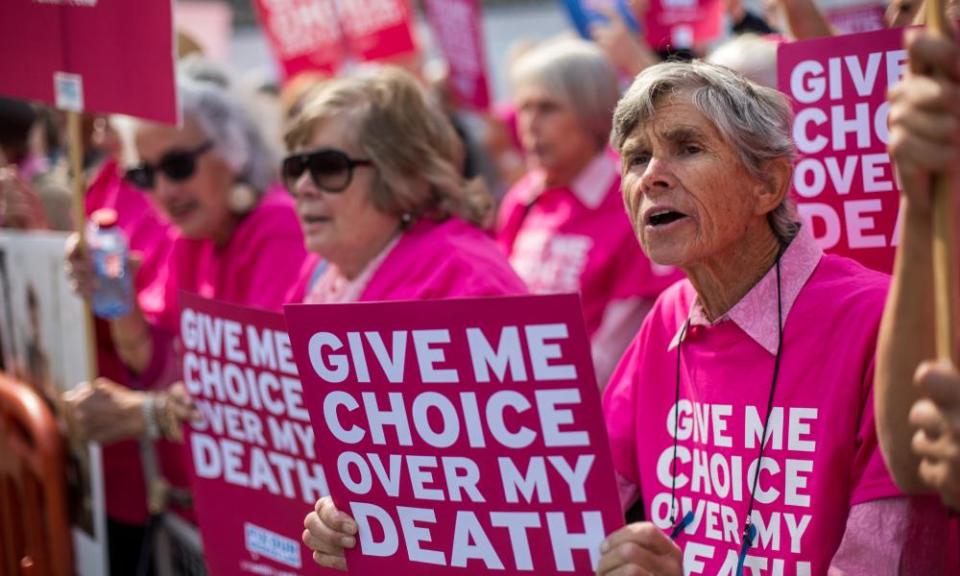Most Britons want assisted dying legalised. Why are MPs too cowardly to do it?

What are MPs for? The assisted dying bill, to be debated on Friday in the House of Lords, ranks with past laws on divorce, abortion and sexuality in the canon of social liberalism. It is unfinished business of the 1960s.
The bill also lies at the heart of how a free democracy should regulate issues of life and death, with deep significance for millions of Britons at a time of their maximum pain and despair. An overwhelming majority in the UK now want reform. Yet MPs lack the guts to give it to them.
As with its drug laws and inhumane prisons, Britain is falling fast down the league table of progressive nations. This is not because it is inherently illiberal. It is because its parliament is dysfunctional, no longer up to scratch. That the House of Commons should kick the issue of assisted dying into an unelected chamber, many of whose members have either inherited or bought their seats, is a disgrace.
Irish women in need of an abortion once had to go abroad to escape religious fundamentalism. In the same way, terminally ill Britons must find £10,000 to go to Switzerland if they wish to die in comfort and dignity. Anyone helping them risks prosecution. It is similar to the new Texas law that allows any private citizen to sue those who drive a patient to an abortion.
Of course, assisting anyone who wishes to end their life raises sensitive questions of regulation. They are rehearsed ad nauseam whenever assisted dying is debated. It is difficult to kill oneself, particularly in extremes of incapacity and pain, but help from a loved one can be equally hard. It can also be a supreme act of love. Likewise, help from a doctor can be a supreme act of consideration and care.
These are issues of desperate delicacy, unsuited to the bludgeon of the criminal law. The legislator’s task is not to throw up hands in horror. It is to get stuck in and regulate.
Public support for assisted dying is now overwhelming. In August, a YouGov opinion poll showed three-quarters of Britons in favour, equally spread among voters of all parties. Doctors, understandably vexed by the issue of end-of-life care, have come around to letting parliament decide. Regulated assisted dying is now practised across the world, in Canada and Australia, the Netherlands and California, Switzerland and Spain.
British courts – confronted by a bad law, the indolence of parliament and the reluctance of juries to convict – have tried to help the police and prosecutors off the moral hook. Formal guidance tries to take account of compassion and an absence of “encouragement”. But as Stephen Sedley, a former court of appeal judge, has written, a confusion of “assisting to die” with “encouraging to die” is ethically shambolic. So too is the assessment of “compassion”. As Sedley points out, a loved one can hardly protest compassion in the hope of clemency when also being warned “not to say anything” that may be used in evidence against them. The law is “both medieval and arguably unlawful,” he says.
Every few years, the House of Lords comes up with a suggested reform. Lord Joffe did in 2003, Lord Falconer in 2014 and this week Baroness Meacher. Her bill would enable those “whose suffering is beyond the reach of palliative care to die well and on their own terms, should they choose it”. The safeguards against the improper use of such a law are properly tight – the imminence of death and the approval of two independent doctors and a high court judge – but the objectives are constant. Comfort and dignity.
It is six decades since Britain decriminalised suicide. That assisting in suicide should still be illegal is outdated and wrong. Individuals close to death should be treated as throughout life, as sentient human beings with the freedom to decide how to finish their lives in the company of family and friends. They are not indentured to some external authority. Their existence is not at the disposal of a state, let alone of someone else’s concept of a god. A church should not dictate the law.
Liberal reform is increasingly buffeted by strident minorities, on both the left and right of the politico-religious spectrum. The expressing of strong belief is supposedly a sign of group virility, usually coupled with a demand that other groups obey it. Thus if I declare that abortion and assisted dying are murder, you are not at liberty to disagree.
Reason is no rebuttal to this intolerance. The only response is to assert the rights of majorities – in this case to uphold personal freedom and dignity in a free society. This is not a matter for the House of Lords. That elected MPs and their parties are too cowardly to legislate for what most Britons overwhelmingly want is worse than pathetic: it is undemocratic.
Simon Jenkins is a Guardian columnist

 Yahoo Finance
Yahoo Finance 